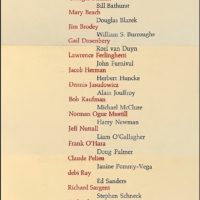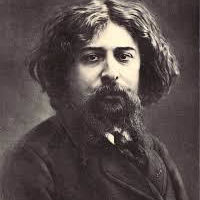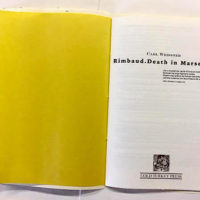This is what one looked like in the old days—1968 to be precise—and have a look at those prices. Then check out the contributors.
Archives for June 2020
The Way the Lines Break
FOR THÉOPHILE GAUTIER
This is what is——the serenity of now
suspended like cumulus clouds, the night
freshened with rain and shafts of white
moonlight so bright I can read you
by the window. This is the tide hidden
from the volcano’s molten flux.
Can the Internet Do This? Nope.
Folio as ‘objet d’art’: “Death in Marseille” by Carl Weissner. Translated and edited from the German by Keith Seward & Jan Herman. Designed and printed by Gerard Bellaart on Handmade Barcham’s Greenpaper. Trim size: 328×220 mm. Edition limited to 12 copies.
Little Magazines and Postcards from Beyond
Jeff Ball, collector extraordinaire of rare Burroughsiana, tells me he recently picked up a handful of relevant little magazines at auction in his seemingly endless quest to capture an intriguing slice of literary history. His collection also includes scattered ephemera which illuminate peculiar nooks and crannies of that literary history sometimes to telling effect. Have a look at a postcard to Herbert Huncke—signed by Allen Ginsberg, William Burroughs, Peter Orlovsky, and Gregory Corso—that he also recently acquired. The ironies abound.
Rimbaud’s Last Words … as Written by Carl Weissner
The text, translated and edited from the German, has been produced by Cold Turkey Press in an edition limited to 12 copies, to pay tribute to the memory of Carl Weissner, who was born on this day, June 16, in 1940.
GC CUNY Keeps the Conversation Going:
Reducing Inequality Now (with Darrick Hamilton,
Paul Krugman, Eduardo Porter, and Janet Gornick)
Register for this Zoom event (Thursday, June 18, 7:30 p.m. ET). As the COVID-19 pandemic has exposed gaps in the social safety net, protests in the aftermath of George Floyd’s murder have mobilized a powerful new movement for racial justice. Leading economic experts discuss the gaping disparities by race and class that have driven so many Americans into the streets, and examine the prospects for policy and institutional changes that could create a more equal society, starting today.
Last Leg Home . . .
. . . after five-mile walk . . . in rural retreat . . . too bad the video does an injustice to the vivid colors of the leafy green cathedral of trees, the red-brown earth of the road and, most of all, to the rich scent of pine in the air.
Collage by Late Cubist, Age 8, Bored in Lockdown
Boredom sometimes works wonders . . . with teacher’s help.
Latest Find Thrills Collector of Rare Burroughs/Gysin Books
Jeff Ball’s latest acquisition—a first-edition copy of “The Exterminator”— is not only signed by both William Burroughs and Brion Gysin but has original artwork that Gysin drew and signed on an inside page. “I’m giddy!” says Ball, whose collection of rare first editions by Burroughs and associated writers, includes some of the most hard-to-find materials anywhere.
GC CUNY Keeps the Conversation Going:
Activists of the Civil Rights Movement
This week, for a historical perspective on protest movements, The Graduate Center, CUNY, highlights a discussion with civil rights leaders of the ’60s from its video archive. The discussion is moderated by Carol Jenkins, host of Black America on CUNY-TV. Guests include Ruby Sales, a key figure in the Alabama “Freedom Summer” voter registration drive, and Reverend Herbert Daughtry, who played an instrumental role in the struggle for school desegregation. Clarence Taylor, professor of history at The Graduate Center and Baruch College, provides commentary.
In My Rural Corner of Trumpistan
. . . the protest is peaceful . . . and on Sunday it was heartfelt.
Speaking of Translation
“My texts belong to the world / Even when they are forged copies / My translators complain of climbing steps to attics / They complain of sifting through the debris in basements / They complain over the endless boxes stored / In countries that don’t even allow them entry / A watchdog guards a box somewhere in Moscow / An irate lover protects another box / My translators complain of bad backs and dust / One translator complained because of the food …” —William ‘Cody’ Maher
Genes of Irish Genius in ‘Blooming Molly Malone’
A friend writes: A little re-Joyceing in this wee lonesome blooming Molly Malone. You can hear the genes of Irish genius in the DNABC of this little clamourer. You feel she’s on the verge of channelling Beckett, Behan, O’Casey, O’Brien, Yeats et al, at any moment. A true antidote to popery and nunnery, and the cold, cold kiss of Covid. A little four-leaf clover complaining from beneath the cloven hoof of parental devilry. She must have been fed Guinness in the womb, there’s so much blarney in her tongue. Man, you feel she possesses such alchemical witchery, she could eat Covid, and shit it out the other end as an emerald. A rare little island of hope.
For Carl Weissner’s Would-Be 80th
Coming on June 16th: “Death in Marseille,” the last words of Arthur Rimbaud as imagined by Carl Weissner. To be published in a limited handmade edition designed by Gerard Bellaart, and translated and edited from the German by Keith Seward & Jan Herman.
GC CUNY Keeps the Conversation Going:
LGBTQ Pride Month Conversation with Patrisse Cullors, co-founder of Black Lives Matter
Artist, organizer, and co-founder of Black Lives Matter, Patrisse Cullors is the co-author of the best seller “When They Call You a Terrorist: A Black Lives Matter Memoir.” At the age of 16, Cullors discovered her passion for helping young queer women facing the challenges of poverty, prejudice, and violence. In 2013, she co-founded the #BlackLivesMatter movement, which has grown into an international organization fighting anti-Black racism. She spoke with Justin T. Brown, executive director of CLAGS: The Center for LGBTQ Studies.














